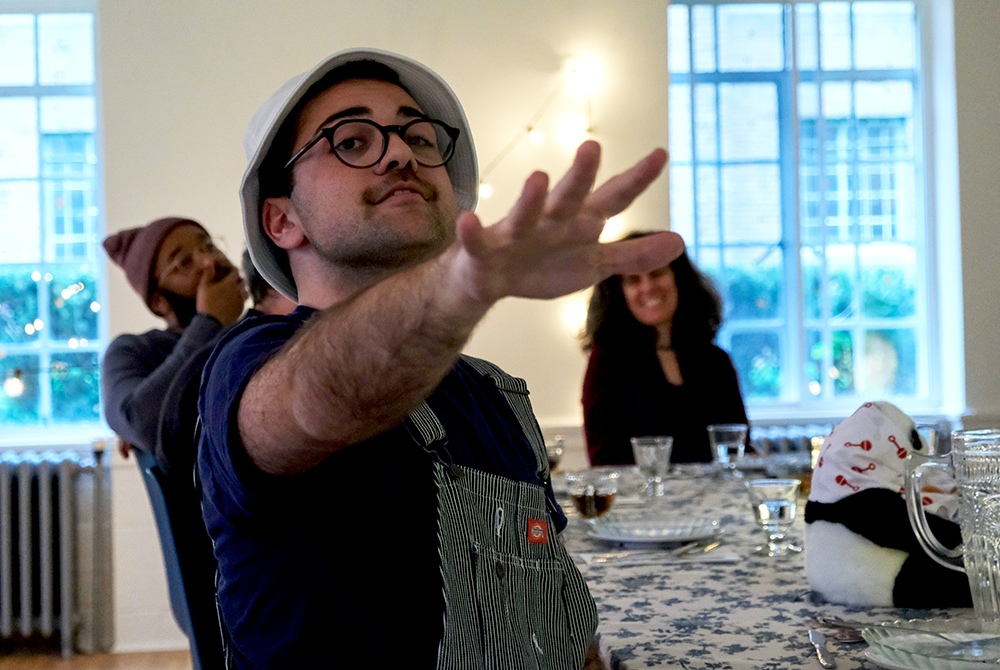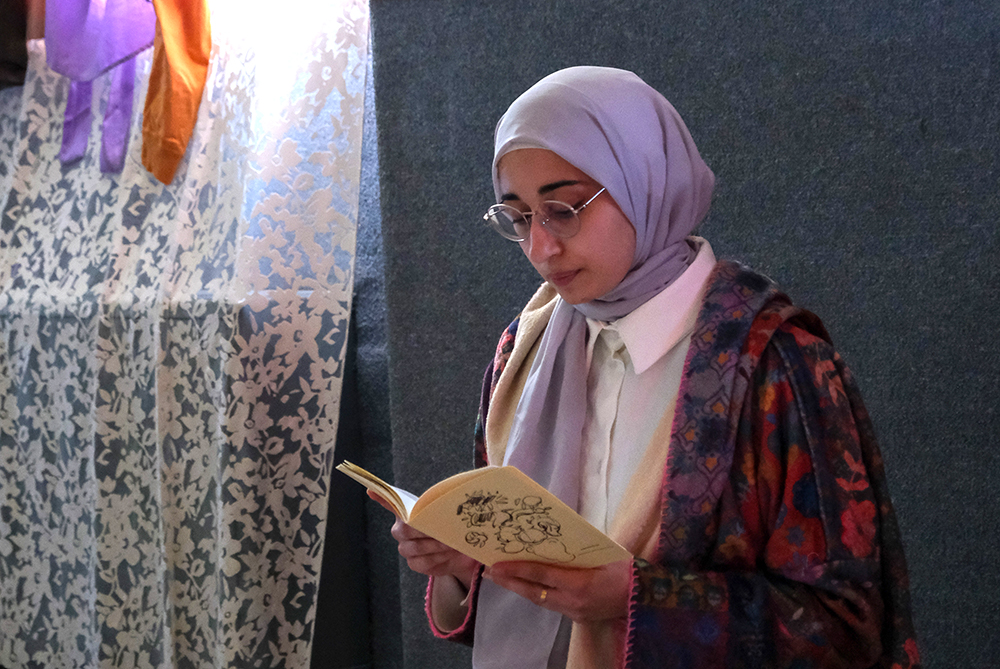Material As Witness: Third Cohort of Human Rights & the Arts MA Students Present Thesis Projects
Aya Rebai’s “Who Needs AI, We Need Potatoes” commented on human exceptionalism, technology, and non-human life forms. Photo by Grace Crummett.
Tania El Khoury, Director of the Center for Human Rights and the Arts, explains that all the thesis projects demonstrate the theme of “Material As Witness” in that students provided original research and evidence found in state and personal archives and created material that speaks to current socio-political issues.
Disrupting a Traditional Dining Experience
Luka Gotsiridze’s “ვითომ-ვითომ [Vitom-Vitom]” is an interactive performance exploring personal accounts of queer resistance to the normative gender roles that are ingrained in Georgian national identity and culture. Gotsiridze used autoethnographic research, literature reviews, and interviews with other Georgian LGBTQ+/queer individuals in exile to develop the project. Attendees were invited to join a traditional Georgian feast, or supra, which was then disrupted by imaginative childhood play.

Luka Gotsiridze’s “Vitom-Vitom” explored personal accounts of queer resistance to normative gender roles within Georgian national identity. Photo by Grace Crummett.
Seated at a table with formal place settings, guests were served Georgian national dishes as Gotsiridze explained how the lavish supra meal symbolizes heteronormativity and traditional masculinity. As the highly ritualized meal progressed, Gotsiridze disrupted it by assuming a childlike demeanor, crawling under the table to play with cut-out paper characters, a sort of reenactment of his own childhood practices. He explained how he and other queer subjects have used imaginative worlds, such as the cut-outs, to navigate feelings of disconnection from traditional practices in his home country, while simultaneously seeking refuge and agency. Afterwards, diners were asked to join in singing a traditional Georgian folk song.
“Through paper-cut characters, communal feasting, and polyphonic singing, I’m trying to reclaim my childhood position at the table while examining notions of cultural belonging and queer space-making,” explains Gotsiridze.
Gotsiridze says he appreciates that CHRA is committed to an alternative approach to scholarly production that goes beyond mainstream, western perspectives, and merges embodied knowledge with various disciplines. “We managed to translate and transmit political narratives beyond legal prescriptions or prevailing Global North perspectives on what human rights are and what they should be,” he says of his masters project.
Examining Human Exceptionalism
Aya Rebai’s “Who Needs AI, We Need Potatoes,” is an interactive performance installation that provides commentary on human exceptionalism and the way people often overlook non-human beings. Audience members were invited to interact with seemingly sentient or “smart” plants grown in a mobile farm stand and asked to reflect on the role of new technology in disrupting the Anthropocene, the current era in which humans have substantially impacted the planet. Rebai, originally from Tunisia, based her project on research she conducted into biohacking, object-oriented ontology (the study of the nature of being), and speculative design.
As background, Rebai developed a fictional scenario in which the uploading of data into plants' DNA becomes a common practice, with scientists insisting it is a harmless activity that will not affect the plants’ behavior. Rebai used AI to generate each plant's “voice” and sound editing software to enable a dialogue between the plants and the audience.
The audience was invited to speak into a microphone and ask the potato, onion, and pepper plants in the farm stand questions, such as how they felt about humans and their thoughts about global warming. “Speaking” in robotic, digitally generated voices, the plants warned audience members that their answers might not be satisfactory, responding instead with both gravity and humor, sometimes providing heavily theoretical answers and other times responding with vague references to pop culture or political speeches. The emerging plant-human dialogue ultimately proved the fictional scientists wrong, as the technology-infused plants began to create a world where human interests were de-prioritized.
Rebai says the project and the MA program have provided her with a platform to expand her research and delve deeper into speculative design and objects-oriented ontology as “tools to examine human and non-human relationships and to challenge the subject/object binary.”

Raneem Ayyad’s “Where Do We Meet The Sun?” investigates the correlation between types of apartment buildings and the prevalence of illnesses related to sun inaccessibility in Jordan. Photo by Grace Crummett.
Analyzing Architecture, Illness, and Gender
Raneem Ayyad’s “Where Do We Meet The Sun?” is a research project in the form of an interactive installation and an article. It investigates the correlation between types of apartment buildings and the prevalence of illnesses related to sun inaccessibility in Al-Zarqa City, Jordan, where Ayyad grew up. Ayyad analyzes the tensions between architectural and social functions and their influence on the health of inhabitants, particularly vulnerable community members. She then presents these individuals as active generators of knowledge, capable of realizing the collective spatial and social needs of their communities. The project is based on collaborations Ayyad had with three homemakers, using a participant observation method called “Follow the Mop,” where she joined the women for daily cleaning chores while recording their brief encounters with sunlight.
Throughout the installation/performance, the audience was invited to explore the women’s everyday lives in two designed spaces. In one room, audience members experienced an audio and video installation as they interacted with a “speaking broom” that beckoned them to sweep. During a ten-minute sit-down with the artist in the other room, Ayyad served coffee and sweets to the audience in the comfort of a recreated traditional living room and explained how tracing everyday life inside residential apartments revealed the architecture’s failure to meet the social and health needs of families, leading to illnesses like Vitamin D deficiency and bronchitis. Ultimately, the project examined natural light as a medium of regulation, gender discrimination, and illness enforced by the neoliberal mass production of housing.
Each of the interactive environments that the MA students presented in their thesis projects provided a material experience that let viewers “witness” the lived reality of particular socio-cultural challenges. In this way, the projects focused on the intersection of human rights and the arts as sites for academic and professional enrichment while providing important commentary on pressing social issues.
Post Date: 05-16-2024